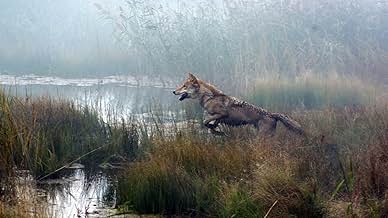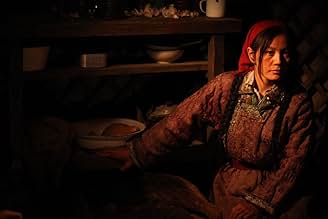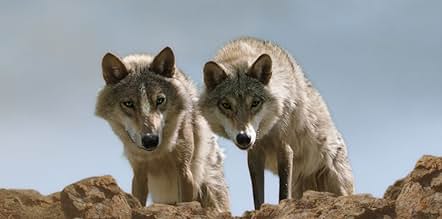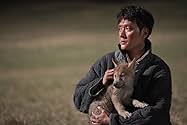Le dernier loup
- 2015
- Tous publics
- 2h 1min
NOTE IMDb
6,6/10
6,4 k
MA NOTE
Pendant la révolution culturelle chinoise, un jeune étudiant urbain est envoyé vivre avec des bergers mongols, où il adopte un louveteau.Pendant la révolution culturelle chinoise, un jeune étudiant urbain est envoyé vivre avec des bergers mongols, où il adopte un louveteau.Pendant la révolution culturelle chinoise, un jeune étudiant urbain est envoyé vivre avec des bergers mongols, où il adopte un louveteau.
- Réalisation
- Scénario
- Casting principal
- Récompenses
- 20 victoires et 16 nominations au total
Ankhnyam Ragchaa
- Gasma
- (as Ankhnyam Rachaa)
Baasanjav Mijid
- Bilig
- (as Basen Zhabu)
Gexige Baoyin
- Batu
- (as Baoyingexige)
Avis à la une
Based on a novel written by Jiang Rong, the story takes place in Mongolia, with sublime landscapes of the Eurasian steppes and describes the daily life of the natives. One of them will adopt a wolf-cub while the wild wolves regularly ravage either the flocks of sheep or the herds of horses.
It is excellently filmed and the film is similar to a naive and contemplative tale for children.
It is excellently filmed and the film is similar to a naive and contemplative tale for children.
This film, in general, is not bad, but the original novel's author is obviously strongly influenced by the Chinese Communism. He glorified the heartless Culture Revolution in last century, and never touched the sensitive taboos of those absolute-NO-NOs indoctrinated by the reigning Chinese Party. What we got in this film is a wonderful Inner Mongolian prairies life. Two displaced young Mandarin men were forced to leave their hometown and exiled to the far and remote Inner Mongolia province, trying to survive for the stipulated 2 years expatriation.
The production team of this movie had hired some specialists to train a bunch of wolves to play the main and critical roles of this film. I have also read some of the scandals related to the rehabilitation of those wolves after the film was completed. what I found the most pretentious flaw in this film is the female actors to play the Mongolian tribal women (like the females in "Spare Parts 2015). They are extremely eye-appealing and cosmetically pretty, yet the truth about the Mongolian females(like the females in "Spare Parts 2015), most of them are not as pretty as what the movie showed us. The other unrealistic part of the film is the kind faces and the gentle way of talk from the local Chinese Communist Party officials. They looked too civilized and too reasonably kind when treating the Mongolian nomad tribes.
The good part of this film is the camera work, the cinematography, it did an amazing job to show us the beauty of the Mongolian wildness, through the lens, it pretentiously beautified the tough livelihood of the local tribes, showed us the wonderful free spirit of those people. But in truth, is it true that the Chinese Communist Party would be that kind? When I watched this film, I have to remind myself that this film was not a documentary film, I had to watch carefully for those phony and false parts of it.
When the Chinese Communist Party censors every book, every movie, every TV program, every blog on line, many real things would be carefully omitted and avoided, otherwise, nothing could be released or past the censorship. So it also means that anything that have been approved must not demonize the Party but praise, otherwise jail time and long term imprisonment would be implemented.
So don't be fooled by this already heavily cosmetically beautified film, by its beautiful cinematography achievement, by those absolutely unreal Mongolian young beauties.
The production team of this movie had hired some specialists to train a bunch of wolves to play the main and critical roles of this film. I have also read some of the scandals related to the rehabilitation of those wolves after the film was completed. what I found the most pretentious flaw in this film is the female actors to play the Mongolian tribal women (like the females in "Spare Parts 2015). They are extremely eye-appealing and cosmetically pretty, yet the truth about the Mongolian females(like the females in "Spare Parts 2015), most of them are not as pretty as what the movie showed us. The other unrealistic part of the film is the kind faces and the gentle way of talk from the local Chinese Communist Party officials. They looked too civilized and too reasonably kind when treating the Mongolian nomad tribes.
The good part of this film is the camera work, the cinematography, it did an amazing job to show us the beauty of the Mongolian wildness, through the lens, it pretentiously beautified the tough livelihood of the local tribes, showed us the wonderful free spirit of those people. But in truth, is it true that the Chinese Communist Party would be that kind? When I watched this film, I have to remind myself that this film was not a documentary film, I had to watch carefully for those phony and false parts of it.
When the Chinese Communist Party censors every book, every movie, every TV program, every blog on line, many real things would be carefully omitted and avoided, otherwise, nothing could be released or past the censorship. So it also means that anything that have been approved must not demonize the Party but praise, otherwise jail time and long term imprisonment would be implemented.
So don't be fooled by this already heavily cosmetically beautified film, by its beautiful cinematography achievement, by those absolutely unreal Mongolian young beauties.
During the Cultural Revolution of 1967, students were sent to the countryside where they worked on farms. Our hero Chen Zhen (Shaofeng Feng) and his friend Yang Ke (Shawn Dou) decided to go to Mongolia, where they stayed with nomads who lived a primitive existence.
Their leader was a wise old man, whom they stayed with, and who taught them not only about farming, but about life and the appreciation of the circle of life. Being sheep farmers, their biggest threat was wolves. The wolves hunt the gazelles, and bury them in a frozen lake to ensure a food supply for their pups the next summer. The villagers dig up some of these frozen gazelles for meat for themselves, but leave enough for the wolves so they don't attack their sheep.
However, when Director Bao learns of the frozen lake, he bribes Yang Ke to reveal its location. He then digs up all the gazelles, leaving the wolves with no food. To make matters worse, they decide to kill all the wolf cubs. Fascinated by the wolves, Chen Zhen decides to capture a wolf cub to study it, but he falls in love with the little wolf and raises it like a dog.
'Wolf Totem' is visually stunning with breathtakingly beautiful cinematography. The wolves are creepy, and there are a few seriously tense moments. Not to give away anything, the storm/horse/wolves scene was STUNNING and nail-biting!
Some of the animal attack scenes are very difficult to watch. Yes, I understand most of it were done by trained wolves, and make-up, and clever editing to make the attacks look realistic, but to see young wolf pups tied up and being dragged behind a wagon was indeed difficult to watch. There's no way these little pups could have been trained and therefore must have been subjected to the 'cruel' behaviour for real. Also, the first two acts were much better than the final act.
Nevertheless, this is a well made film and it certainly looks incredible on screen. It's almost worth watching just for the cinematography alone - and the hauntingly beautiful score by James Horner. Note how scenes suddenly cut from a dark interior to a bright green or bright blue exterior. Stunning! It's like heaven to the eyes.
Their leader was a wise old man, whom they stayed with, and who taught them not only about farming, but about life and the appreciation of the circle of life. Being sheep farmers, their biggest threat was wolves. The wolves hunt the gazelles, and bury them in a frozen lake to ensure a food supply for their pups the next summer. The villagers dig up some of these frozen gazelles for meat for themselves, but leave enough for the wolves so they don't attack their sheep.
However, when Director Bao learns of the frozen lake, he bribes Yang Ke to reveal its location. He then digs up all the gazelles, leaving the wolves with no food. To make matters worse, they decide to kill all the wolf cubs. Fascinated by the wolves, Chen Zhen decides to capture a wolf cub to study it, but he falls in love with the little wolf and raises it like a dog.
'Wolf Totem' is visually stunning with breathtakingly beautiful cinematography. The wolves are creepy, and there are a few seriously tense moments. Not to give away anything, the storm/horse/wolves scene was STUNNING and nail-biting!
Some of the animal attack scenes are very difficult to watch. Yes, I understand most of it were done by trained wolves, and make-up, and clever editing to make the attacks look realistic, but to see young wolf pups tied up and being dragged behind a wagon was indeed difficult to watch. There's no way these little pups could have been trained and therefore must have been subjected to the 'cruel' behaviour for real. Also, the first two acts were much better than the final act.
Nevertheless, this is a well made film and it certainly looks incredible on screen. It's almost worth watching just for the cinematography alone - and the hauntingly beautiful score by James Horner. Note how scenes suddenly cut from a dark interior to a bright green or bright blue exterior. Stunning! It's like heaven to the eyes.
French filmmaker Jean-Jacques Annaud's China-France co-production is his third enterprise tackling with human-animal equilibrium, after THE BEAR (1988) and TWO BROTHERS (2004), WOLF TOTEM is adapted from a popular semi-autobiographical Chinese novel of the same title and is shot in the majestic Inner Mongolian steppe.
During China's Cultural Revolution, in 1969, two students from Beijing, Chen Zhen (Feng) and Yang Ke (Dou) are assigned to the steppe to teach local Mongolian nomads Mandarin and smooth the process of cultural integration. They are under the aegis of Bilig (Mijid), the head of the nomads, a sage mind who inculcates them the precept of the balanced co-existence between mankind and indigenous wolves. But, a pervading human force of greed and self-seeking would soon disrupt the well-maintained balance, wolves are deprived of their sustenance and during one blizzard night, driven by hunger, they attack a horde of horses and result in great casualty, including Bilig's son (although it is an accident). Retaliation is conducted under the command of an apparatchik (Yin), many wolf cubs are perished for the sake of their skins, but Chen saves one cub, secretly raises it like a pet and attachment grows. As often, one considers him or herself doing a good deed would only realise later in the stage it is a mistake, domesticating a feral wolf isn't something worth commending, and it is noteworthy that Annaud doesn't vindicate Chen's behavior by stating that the cub is bereft or in somewhat danger, Chen's behavior is solely out of his own soft spot, with no regard of the consequence for the cub itself, only after Bilig's sensible advice, Chen would right his wrongs to prepare and train the young wolf for its return to its natural territory, and one should remember, it is always a rookie mistake trying to extract a trickle of humanity out of the wild creatures, mutual connection might be able to achieved, but don't belabor yourself with any illusions of any reciprocal gestures.
The stand-off between humans and wolves will reach its heroic climax after the ravenous wolf pack assails a sheep corral during one night and this time, the entire pack is almost being extirpated by bullets and unrelieved vehicle chase, witnessed powerlessly for Chen, if anything, powerless is the omnipresent feeling, wherever humans tread, there are black sheep undermining the natural grandeur and harmony, disasters are bound to ensue, a central message cannot be dissipated by the film's lugubriously concocted positive vibe in the end. It is a big relief Annaud doesn't settle for facile wishful-thinking or radical aggression in its tonality, so that the film manage to retain an organic slant which conforms with his previous similar oeuvres.
The striking animal stunts orchestrated by dexterous trainer Andrew Simpson greatly hone up the set pieces, especially against its ferocious surroundings (the scenes of frozen animal corpses are manifestations of the primordial power of nature), and it goes without saying the film is a continuous landscape-porn (plus two emphatic examples of cloudscape), although sometimes its immaculateness unfittingly instigates the suspicion of an overachieved CGI-preening during the post-production.
The human cast understandably takes a back seat from its awe-inspiring canine counterpart, but the dialogues sound clunky to a Chinese ear, and the character development barely exists, since when Chen and Gasma (Ragchaa), the widow and daughter-in-law of Bilig, become an item? The emphasis is so top-heavy on Chen and his wolf cub, which makes the romantic subplot comes off as abrupt and fluffy. In the main, WOLF TOTEM doesn't shortchange its forte: the spectacular vista and pulsating action sequences, and it also circumspectly bypasses the sensitive political agenda (the film was a mammoth box-office player two years ago during the golden spell of Chinese Spring Festival) and allows the story itself to stimulate reflections on a broader picture: human vs. nature, simply within ecological parameters.
During China's Cultural Revolution, in 1969, two students from Beijing, Chen Zhen (Feng) and Yang Ke (Dou) are assigned to the steppe to teach local Mongolian nomads Mandarin and smooth the process of cultural integration. They are under the aegis of Bilig (Mijid), the head of the nomads, a sage mind who inculcates them the precept of the balanced co-existence between mankind and indigenous wolves. But, a pervading human force of greed and self-seeking would soon disrupt the well-maintained balance, wolves are deprived of their sustenance and during one blizzard night, driven by hunger, they attack a horde of horses and result in great casualty, including Bilig's son (although it is an accident). Retaliation is conducted under the command of an apparatchik (Yin), many wolf cubs are perished for the sake of their skins, but Chen saves one cub, secretly raises it like a pet and attachment grows. As often, one considers him or herself doing a good deed would only realise later in the stage it is a mistake, domesticating a feral wolf isn't something worth commending, and it is noteworthy that Annaud doesn't vindicate Chen's behavior by stating that the cub is bereft or in somewhat danger, Chen's behavior is solely out of his own soft spot, with no regard of the consequence for the cub itself, only after Bilig's sensible advice, Chen would right his wrongs to prepare and train the young wolf for its return to its natural territory, and one should remember, it is always a rookie mistake trying to extract a trickle of humanity out of the wild creatures, mutual connection might be able to achieved, but don't belabor yourself with any illusions of any reciprocal gestures.
The stand-off between humans and wolves will reach its heroic climax after the ravenous wolf pack assails a sheep corral during one night and this time, the entire pack is almost being extirpated by bullets and unrelieved vehicle chase, witnessed powerlessly for Chen, if anything, powerless is the omnipresent feeling, wherever humans tread, there are black sheep undermining the natural grandeur and harmony, disasters are bound to ensue, a central message cannot be dissipated by the film's lugubriously concocted positive vibe in the end. It is a big relief Annaud doesn't settle for facile wishful-thinking or radical aggression in its tonality, so that the film manage to retain an organic slant which conforms with his previous similar oeuvres.
The striking animal stunts orchestrated by dexterous trainer Andrew Simpson greatly hone up the set pieces, especially against its ferocious surroundings (the scenes of frozen animal corpses are manifestations of the primordial power of nature), and it goes without saying the film is a continuous landscape-porn (plus two emphatic examples of cloudscape), although sometimes its immaculateness unfittingly instigates the suspicion of an overachieved CGI-preening during the post-production.
The human cast understandably takes a back seat from its awe-inspiring canine counterpart, but the dialogues sound clunky to a Chinese ear, and the character development barely exists, since when Chen and Gasma (Ragchaa), the widow and daughter-in-law of Bilig, become an item? The emphasis is so top-heavy on Chen and his wolf cub, which makes the romantic subplot comes off as abrupt and fluffy. In the main, WOLF TOTEM doesn't shortchange its forte: the spectacular vista and pulsating action sequences, and it also circumspectly bypasses the sensitive political agenda (the film was a mammoth box-office player two years ago during the golden spell of Chinese Spring Festival) and allows the story itself to stimulate reflections on a broader picture: human vs. nature, simply within ecological parameters.
I know the name of Jean-Jacques Annaud from The Bear, a movie that made his name a lot more memorable to me than The Name of the Rose, another movie I loved and that he directed. In The Bear, the main character was a little bear cub and any humans in the film were mere secondary characters. The things that film did with animals was nothing short of miraculous.
In this Chinese-French coproduction, there are a lot of wolves and talk about wolves and people getting angry about wolves or loving them, but they are not the main characters. Relegated to the subject of a conversation, wolves play a minor part in this film that doesn't seem to know what it wants to be. It shows a little bit of Chinese Cultural Revolution, but not enough to be of any relevance or warrant the wrath of Chinese authorities. It shows the free way of the Mongols living in the steppes, but it doesn't go in depth. It shows some beautiful wolves, but most of the time they just look pretty and don't do much. It shows men in love with women, but it never goes into romance territory. It shows city boys being schooled in the ways of the steppe, but it doesn't really make anything of it.
The acting was good and so was the direction, I guess. The wide views of the green steppe were beautiful (until the mosquitoes arrived). Yet most of the time is seemed like a fairy tale, lacking a truth that I am not aware of, but that felt like it should be different.
It is not that I didn't like the film, but after two hours of going back and forth between genres, alternating between hating the Communist director who doesn't understand the life of the land and hating just about everybody else for their pretentious stupidity, I was actually bored.
In this Chinese-French coproduction, there are a lot of wolves and talk about wolves and people getting angry about wolves or loving them, but they are not the main characters. Relegated to the subject of a conversation, wolves play a minor part in this film that doesn't seem to know what it wants to be. It shows a little bit of Chinese Cultural Revolution, but not enough to be of any relevance or warrant the wrath of Chinese authorities. It shows the free way of the Mongols living in the steppes, but it doesn't go in depth. It shows some beautiful wolves, but most of the time they just look pretty and don't do much. It shows men in love with women, but it never goes into romance territory. It shows city boys being schooled in the ways of the steppe, but it doesn't really make anything of it.
The acting was good and so was the direction, I guess. The wide views of the green steppe were beautiful (until the mosquitoes arrived). Yet most of the time is seemed like a fairy tale, lacking a truth that I am not aware of, but that felt like it should be different.
It is not that I didn't like the film, but after two hours of going back and forth between genres, alternating between hating the Communist director who doesn't understand the life of the land and hating just about everybody else for their pretentious stupidity, I was actually bored.
Le saviez-vous
- ConnexionsReferenced in At the Movies: Cannes Film Festival 2013 (2013)
Meilleurs choix
Connectez-vous pour évaluer et suivre la liste de favoris afin de recevoir des recommandations personnalisées
- How long is Wolf Totem?Alimenté par Alexa
Détails
- Date de sortie
- Pays d’origine
- Site officiel
- Langues
- Aussi connu sous le nom de
- Wolf Totem
- Lieux de tournage
- Xilingol Grassland, Inner Mongolia, Chine(major location)
- Sociétés de production
- Voir plus de crédits d'entreprise sur IMDbPro
Box-office
- Budget
- 38 000 000 $US (estimé)
- Montant brut aux États-Unis et au Canada
- 210 591 $US
- Montant brut mondial
- 125 837 070 $US
- Durée2 heures 1 minute
- Couleur
- Mixage
- Rapport de forme
- 2.35 : 1
Contribuer à cette page
Suggérer une modification ou ajouter du contenu manquant

Lacune principale
What is the Brazilian Portuguese language plot outline for Le dernier loup (2015)?
Répondre



























